Parliament has voted to ask the government to end an agreement to host US troops in Iraq. The move would oust all foreign soldiers, including those from Germany. President Trump has threatened Iraq with sanctions.
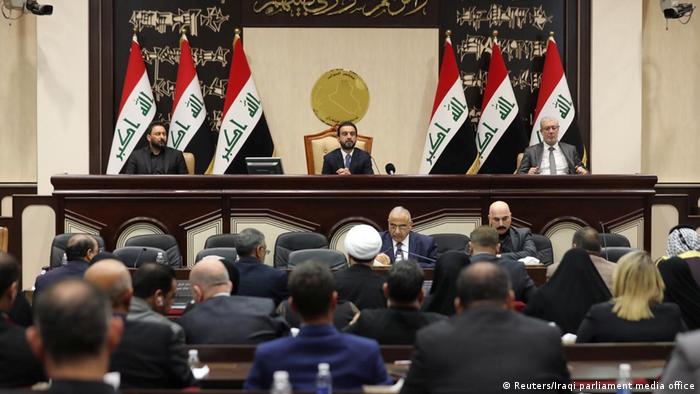
The Iraqi parliament has voted to remove US troops from Iraq. In an extraordinary session, lawmakers backed a resolution to ask the government to end an agreement with Washington to station 5,200 troops in Iraq.
Sunday's resolution specifically calls for ending a 2014 agreement that allows Washington to send troops to Iraq to help in the fight against the "Islamic State" group.
"The government commits to revoke its request for assistance from the international coalition fighting 'Islamic State' due to the end of military operations in Iraq and the achievement of victory," the resolution read.
"The Iraqi government must work to end the presence of any foreign troops on Iraqi soil and prohibit them from using its land, airspace or water for any reason."
The move provoked a swift response from Washington, as it expressed its disappointment with the decision.
"We strongly urge Iraqi leaders to reconsider the importance of the ongoing economic and security relationship between the two countries and the continued presence of the Global Coalition to Defeat ISIS," said a State Department spokesperson.
"We believe it is in the shared interests of the United States and Iraq to continue fighting ISIS together," and that the US is still "committed to a sovereign, stable, and prosperous Iraq."
President Donald Trump has threatened Iraq with debilitating sanctions, should the Middle Eastern country force US troops to leave.
Iran suspends 2015 nuclear deal commitments
Germany seeks 'stability and unity'
The decision to expel forces from the country also includes representations from other nations, among them Germany. Foreign Minister Heiko Maas expressed his concerns over the increasing tensions in the Middle East, but also iterated that the Iraqi government's position must be respected.
"Our overriding interest is that stability and unity in Iraq is not falling victim to the recent escalation," Maas stressed late Sunday. On the Iraqi government, he added: "We will respect every decision."
The German government said late Sunday that its military presence in Iran would "only remain if the Iraqi government wanted that."
Read more: Pressure mounts on US troops in Iraq
Adel Abdul-Mahdi, Iraq's caretaker prime minister, said officials are preparing a memo for legal and procedural steps to implement parliament's resolution. He also said that if US troops remains then they will be considered an occupying force.
"Despite the internal and external difficulties that we might face, it remains best for Iraq on principle and practically," he told parliament.
Iraqi mourners take to the streets
What does the resolution mean?
The resolution is nonbinding, but it is likely to be heeded by the government as Abdul-Mahdi supports the measures.
The resolution was passed two days after the killing of Iranian Major General Qassem Soleimani in Baghdad by US airstrikes.
Read more: Who was Qassem Soleimani, Iran's Quds Force leader?
Populist Iraqi Shiite cleric Moqtada al-Sadr has called for a more substantial response to the killing.
"I consider this a weak response, insufficient against American violation of Iraqi sovereignty and regional escalation," said al-Sadr, who leads the largest bloc in parliament, in a letter to the assembly read aloud by a supporter.
Iraq summons US envoy, complains to UN
Prime Minister Abdul-Mahdi also told parliament that Soleimani was due to meet with him the day he was killed and deliver a response from the Iranians to a Saudi message that could have led to a de-escalation of tensions in the region, according to the Reuters news agency.
Iraqi officials have also summoned the US envoy to Iraq, Matthew Tueller, over the airstrikes.
"[The airstrikes] were a blatant violation of Iraqi sovereignty," Iraq's Foreign Ministry said in a statement on Sunday. They "contradict the agreed-upon missions of the international coalition."
The Foreign Ministry has also lodged an official complaint with the UN secretary-general and the Security Council over the US airstrikes.
Read more: How the Soleimani assassination was reported in Germany
The complaint mentions "American attacks and aggression on Iraqi military positions and the assassination of Iraqi and allied high-level military commanders on Iraqi soil," according to the Foreign Ministry.
Work with German troops in Iraq halted
Rocket attack
Later Sunday, at least three explosions reverberated across the Iraqi capital as sirens could be heard near the Tigris River.
The blasts appeared to be mortars or rockets that landed inside, or near, the heavily fortified Green Zone, home to the US Embassy and a number of other foreign diplomatic missions, as well as the seat of Iraq's government.
Initially, at least, no casualties were reported after what was the second attack in the last 48 hours.
Each evening at 1830 UTC, DW's editors send out a selection of the day's hard news and quality feature journalism. You can sign up to receive it directly here.
ed, jsi/cmk (Reuters, AP, AFP, dpa)
Pressure mounts in Iraq to boot out US troops
The killing of two top Iranian and Iraqi commanders by US forces could aid Iran in strengthening its foothold in Iraq. Experts say it also undermines the monthslong anti-government protest movement in Iraq.
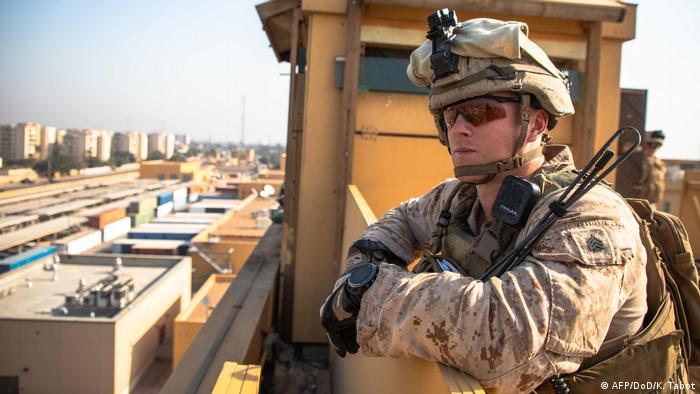
The US strike killing Major General Qassem Soleimani, the commander of the Iranian Revolutionary Guard Corps' elite Quds Force, near Baghdad's airport on Friday was intended to deal a blow to the heart of Iran's Middle East policy.
Instead, that brazen action has facilitated conditions for Iran to achieve one of its main regional objectives: removing the US military from its neighbor.
In an emergency session of the Iraqi parliament on Sunday, lawmakers voted in favor of a resolution asking the government to expel US troops from the country. The measure was passed with mostly Shiite factions voting in favor, while Kurdish and most Sunni members of parliament did not attend the session, presumably because they oppose ending the US presence in the country.
"The government commits to revoke its request for assistance from the international coalition fighting 'Islamic State' due to the end of military operations in Iraq and the achievement of victory," the resolution read.
"The Iraqi government must work to end the presence of any foreign troops on Iraqi soil and prohibit them from using its land, airspace or water for any reason," it continued.
Read more: Who was Qassem Soleimani, Iran's Quds Force leader?
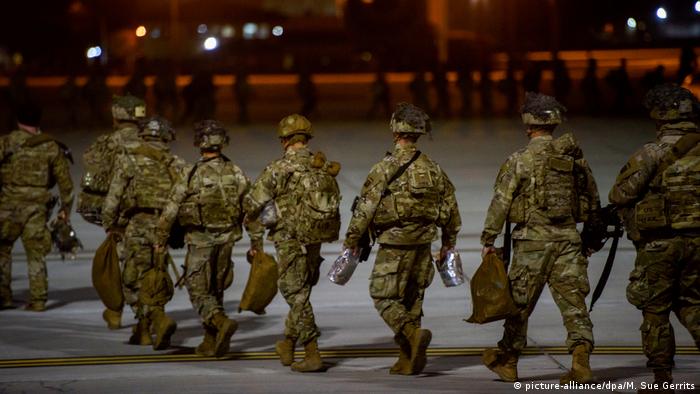
The US still has thousands of troops in Iraq
Comrades-in-arms
The resolution still needs to be approved by the Cabinet, but interim Prime Minister Adel Abdel-Mahdi voiced support as he railed against US violations of Iraqi sovereignty.
"Despite the internal and external difficulties that we might face, it remains best for Iraq on principle and practically," Abdel-Mahdi told parliament.
About 5,200 US troops are deployed at Iraqi military bases to train and support local security forces to prevent a resurgence of the "Islamic State" (IS). The troops are there at the invitation of the Iraqi government as part of an US-led international coalition against the extremist group.
Iran-backed Iraqi militia and US troops fought alongside each other during Iraq's 2014-2017 war against IS militants. But the extremist group's territorial defeat has opened new dynamics between adversaries Washington and Tehran at a time of escalating tensions since US President Donald Trump in 2018 withdrew from an international nuclear deal with Iran.

Mahdi has accused the US of violating Iraqi sovereignty
Tightrope act
Anger in Iraq at the United States has boiled over as Baghdad finds itself dragged into a geopolitical struggle between the Washington and Tehran, two allies with which it has sought to balance relations.
Even before Friday's strike at Baghdad's International Airport on the convoy in which Soleimani was traveling, there was growing pressure from Iran's powerful Shiite militia and political allies for US troops to exit the country.
Those calls became louder after US airstrikes killed 25 militia fighters of the Iranian-backed Kataeb Hezbollah. The strikes came in response to rocket attacks, blamed on the Kataeb Hezbollah, that killed a US defense contractor and wounded several US and Iraqi soldiers at the K1 military base near the northern Iraqi city of Kirkuk.
An organized mob of Shiite militiamen responded by storming the US Embassy, after entering the heavily fortified Green Zone as Iraqi security forces initially looked on. They left a day later, saying their message had been received and that the prime minister had provided assurance for a parliamentary vote on the US military presence.
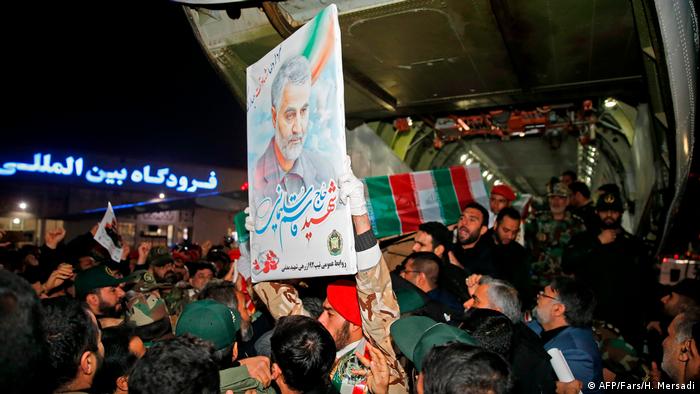
Crowds of mourners turned out in Iran to pay respects to Soleimani's coffin when it was flown back from Iraq
Abu Mahdi al-Muhandis, the leader of Kataeb Hezbollah and deputy head of Iraq's state-sanctioned Popular Mobilization Units, was among those vowing revenge in front of the US Embassy. He was joined by Qais al-Khazali, leader of the Iranian-backed Asaib Ahl al-Haq militia, and Hadi al-Amiri, the head of the powerful Badr Organization, who leads a bloc with the second-largest number of seats in parliament.
Muhandis was killed alongside Soleimani and eight others in the US drone strike on Friday.
From the Iraqi viewpoint, "the killing of Muhandis is more consequential than that of Soleimani, since he was one of the highest Iraqi security officials," Heiko Wimmen, the project director for Iraq, Syria and Lebanon at the International Crisis Group, told DW.

Soleimani and Muhandis were both leading military figures
Growing calls
Amiri and influential Shiite cleric Moqtada al-Sadr, who heads the largest bloc in parliament, buried their rivalry to unite behind Sunday's resolution. Both leaders and other militia leaders are threatening to use force to oust US troops from Iraq.
Sadr, a nationalist populist who rails against US and Iranian influence in the country, said Sunday that the action by parliament didn't go far enough and that the US Embassy should be shuttered.
"Finally, I call specifically on the Iraqi resistance groups and the groups outside Iraq more generally to meet immediately and announce the formation of the International Resistance Legions," he said, in apparent reference to Iran-backed groups across the region spreading from Syria and Lebanon to Yemen.
As Iran and its Iraqi Shiite allies vow to retaliate against the United States, strategically the easiest and least risky place for a first response is politically in Iraq, experts said.
"A far more effective response than unguided missiles on embassies and bases or tanker attacks would be a political response that forces an American withdrawal from Iraq," said Fanar Haddad, a senior research fellow at the Middle East Institute at the National University of Singapore.
"This would achieve a long-held Iranian objective and help consolidate Iran's control of Iraq. It is very likely that this crisis will serve to strengthen the position of Iran-leaning political actors even if it does not achieve the ultimate objective of forcing an American withdrawal," he said.
Read more: How Soleimani assassination was reported in Germany
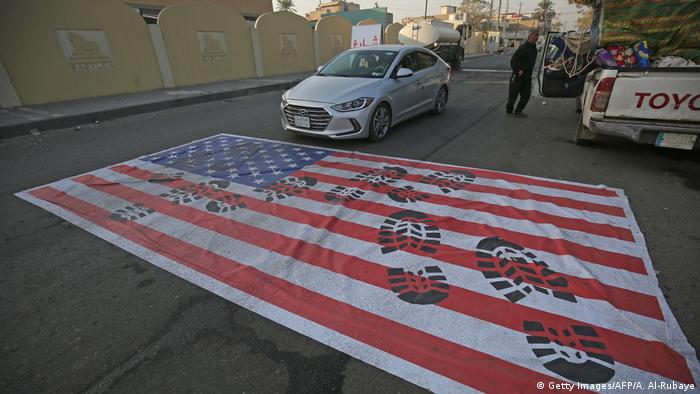
This mock US flag was recently laid out on a Baghdad street for cars to drive over
Not so easy
Wimmen said that the United States has invested a lot of money in Iraq and it was unlikely Washington will leave military bases so easily.
"I expect they will dispute the competence of the Iraqi parliament to take such a decision and try to draw this out," he said.
The push to expel the United States comes as Iraq is in the throes of a political crisis following nearly three months of deadly anti-government protests over corruption, poor services and Iranian influence.
The grassroots protest movement is calling for the wholesale uprooting of the post-2003 political system that serves narrow sectarian elites and their cronies. It already forced Abdel-Mahdi to resign, although he remains head of a caretaker government. The country has since been in political paralysis.
Some anti-government protesters cheered Soleimani's death on Friday, blaming him and pro-Iran militia of killing more than 450 protesters and wounding at least 20,000 more. US Secretary of State Mike Pompeo shared a video on Twitter describing Iraqis as "dancing in the street for freedom, thankful that General Soleimani is no more."
Yet in a show of force a day later, hundreds of thousands who were mourning the "martyrdom" of Soleimani and Muhandis shouted "Death to America" in Iraqi streets as the two bodies were moved through Baghdad and the Shiite holy cities of Najaf and Karbala. Iraq's top political and Shiite religious leaders joined in honoring Soleimani and Muhandis and condemning the US strikes.
Read more: US and Iran: Decades of enmity
Iraqi mourners take to the streets of Baghdad
'Bad news' for protesters
The strikes have boosted pro-Iran Shiite factions in Iraq seeking to quash threats to their vested interests. Those factions have moved to capitalize on them to undermine the grassroots protest movement.
The assassination of Soleimani and Muhandis "is bad news for the protest movement," Haddad said.
"The assassinations in effect have created what opponents of the protest movement have been searching for since October: a countercause that can create counterprotests and counterpressure," he said.
Wimmen agreed: "It's hard to see how the protest movement can survive the nationalist rallying cry from the Shiite parties.
DW RECOMMENDS
US and Iran: Decades of enmity
The targeted killing of Iranian General Qassem Soleimani by the US is the latest episode in a troubled relationship. DW examines the tensions between the two nations dating back decades. (03.01.2020)
Fearing Soleimani reprisal, Germany revises terror threat level
The country's top police institution fears Israeli and US facilities could be targeted by terrorists following the assassination of Iranian General Qassem Soleimani. Many German states are already on high alert. (04.01.2020)
Iraq slams US airstrikes, warns of consequences
Iraqi Prime Minister Adel Abdul Mahdi has denounced US attacks on an Iranian-backed militia in his country. The airstrikes in response to the killing of a US citizen come amid high tensions between Tehran and Washington. (30.12.2019)
Pressure mounts in Iraq to boot out US troops
The killing of two top Iranian and Iraqi commanders by US forces could aid Iran in strengthening its foothold in Iraq. Experts say it also undermines the monthslong anti-government protest movement in Iraq. (05.01.2020)
Who was Qassem Soleimani, Iran's Quds Force leader?
From consolidating Iranian influence in Iraq to waging war against the "Islamic State" in Syria, General Qassem Soleimani was an instrumental figure for Iranian aspirations in the region. DW examines his life. (03.01.2020)
No comments:
Post a Comment